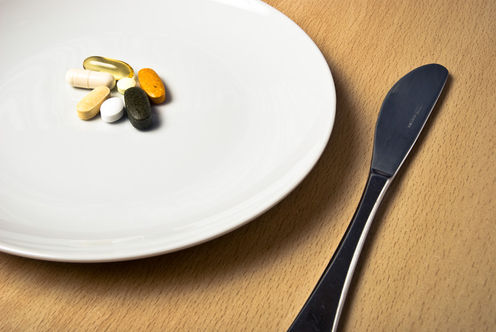
Have you ever been advised to take a medicine with food? How about taking a medicine with cola or avoiding grapefruit?
Hundreds of medicines have food-related dosing instructions. With four out of five Australians aged above 50 taking daily medication, most people will encounter instructions about medicines and food at some point in their lives – some of which may seem rather strange.
If a medicine isn’t taken as recommended with respect to food, the medicine may not have an effect. Worse, it could lead to side effects. The timing of the meal, the size of the meal, and the types of food and drinks consumed can all affect the body’s response to a medicine.
Absorption of medicines from the gut
Eating food triggers multiple physiological changes, including increased blood flow to the gut, the release of bile, and changes in the pH (acidity) and motility of the gut. These physiological changes can affect the amount of medicine absorbed from the gut into the bloodstream, which can then impact on the body’s response to a medicine.
Certain medicines are recommended to be given with food because the physiological changes after eating can increase the amount of medicine absorbed by the body. Itraconazole capsules (used to treat certain fungal infections), for instance, should be taken with food, and in some cases acidic drinks such as cola, because this product needs an acidic environment to be absorbed.
In other cases, changes in gut secretions and the digestive process can reduce the effectiveness of a medicine. Certain antibiotics, such as phenoxymethylpenicillin (also known as penicillin V), are best taken on an empty stomach as they can be less effective after prolonged exposure to acidic conditions.

Food can act as a physical barrier to the surface of the gut wall and prevent certain medicines being absorbed into the bloodstream.
Specific components of food, such as calcium or iron, may also bind to certain medicines. This can reduce absorption into the bloodstream, and lead to reduced effectiveness. For this reason, osteoporosis medicines risedronate and alendronate must be taken on an empty stomach with water only.
Taking certain medicines with food can reduce the risk of side effects. Diabetes medicines such as gliclazide or glimepiride (belonging to the group of medicines known as sulfonylureas), for example, should be taken with food to reduce the risk of low blood sugar.
Taking medicines such as ibuprofen (for pain and inflammation) or metformin (for diabetes) with food is also recommended to reduce nausea and stomach upset.
Does size really matter?
The relationship between meal size and medicine effect has not been widely studied. If you need to take a medicine with food and it’s not mealtime, sometimes a snack is enough. But for some medicines, the size of the meal is important. Orlistat, for example, reduces the absorption of fats from food to assist weight loss, so it’s important to take this medicine with main meals for optimal effect.

Meal composition can also be important. Eating foods high in fibre, protein or fat can impact on the absorption of some medicines.
Drinks such as tea, coffee, milk and fruit juice can also affect the way certain medicines act in the body.
Dairy products should be avoided within two hours of taking antibiotics such as ciprofloxacin or norfloxacin, however they can be eaten at other times.
You may need to avoid grapefruit altogether as it can interfere with the metabolism (processing) of certain medicines in the body, leading to side effects.
Medicine labels demystified
Check medicine labels carefully for advice about food or drinks. Unless otherwise advised, tablets or capsules should be swallowed with water.
If the label states “take with or after food”, it means the medicine should be taken during the meal, or within half an hour of eating.
To take a medicine “on an empty stomach”, check you have not eaten in the past two hours, and wait at least half an hour after taking the medicine before eating again, unless the label states otherwise.
Finally, it’s important to take medicines at the same time each day and be consistent with respect to food and drinks.
If you have specific questions about taking medicines with food, ask your pharmacist for further advice, check the consumer medicines information (CMI) for each medicine, or call Medicines Line on 1300 633 424.
Janet Sluggett has received funding from the Australian Commission on Safety and Quality in Health Care, and works on a national quality improvement program funded by the Australian Government Department of Veterans’ Affairs. Janet is a member of a national working group that makes recommendations about the advisory labels affixed to medicines when they are dispensed.
